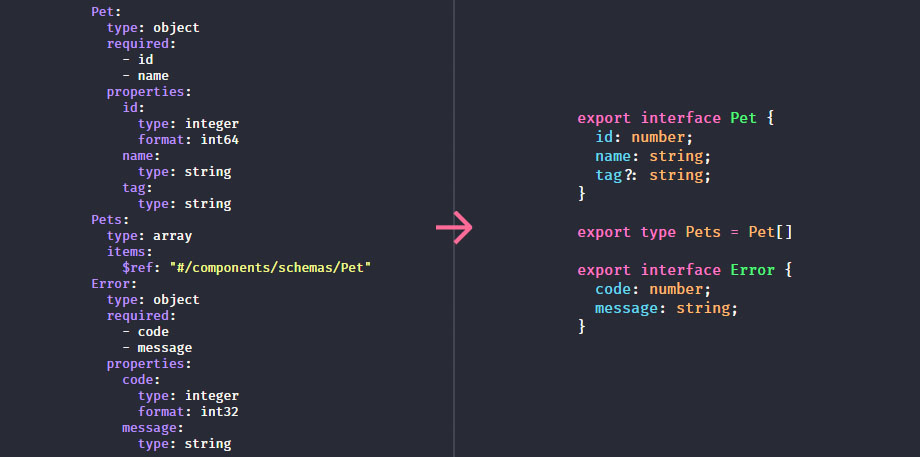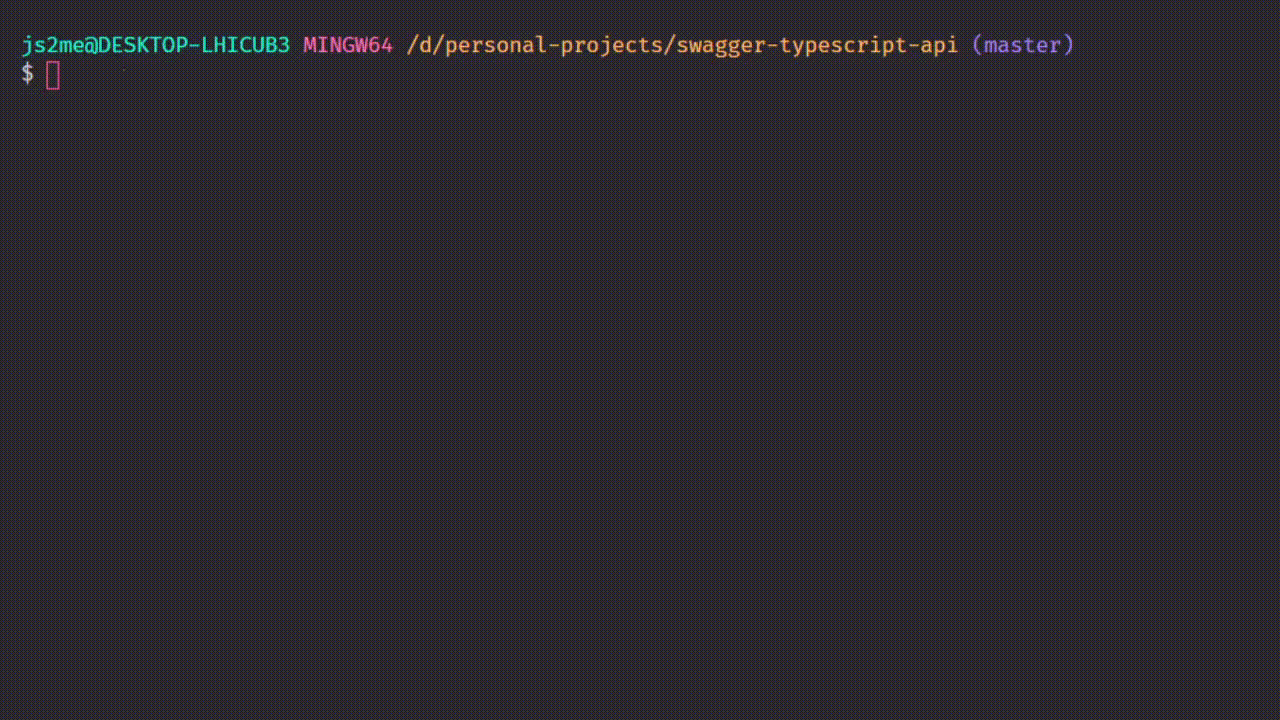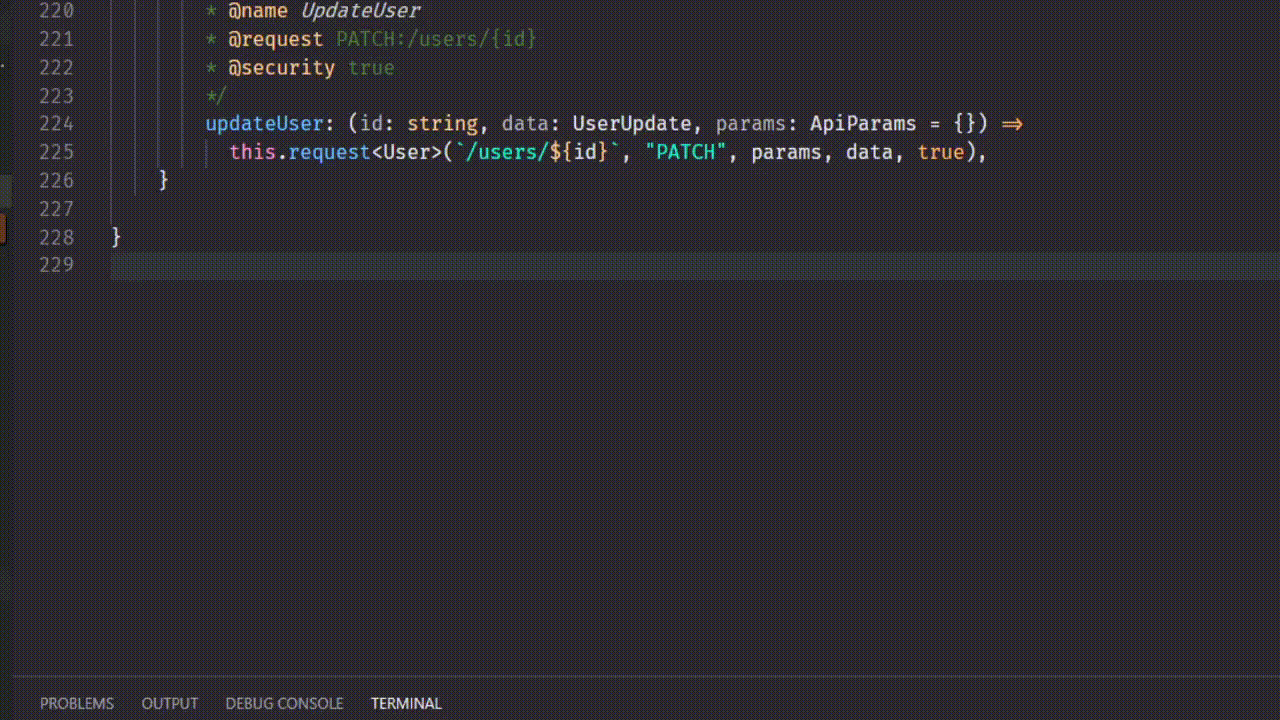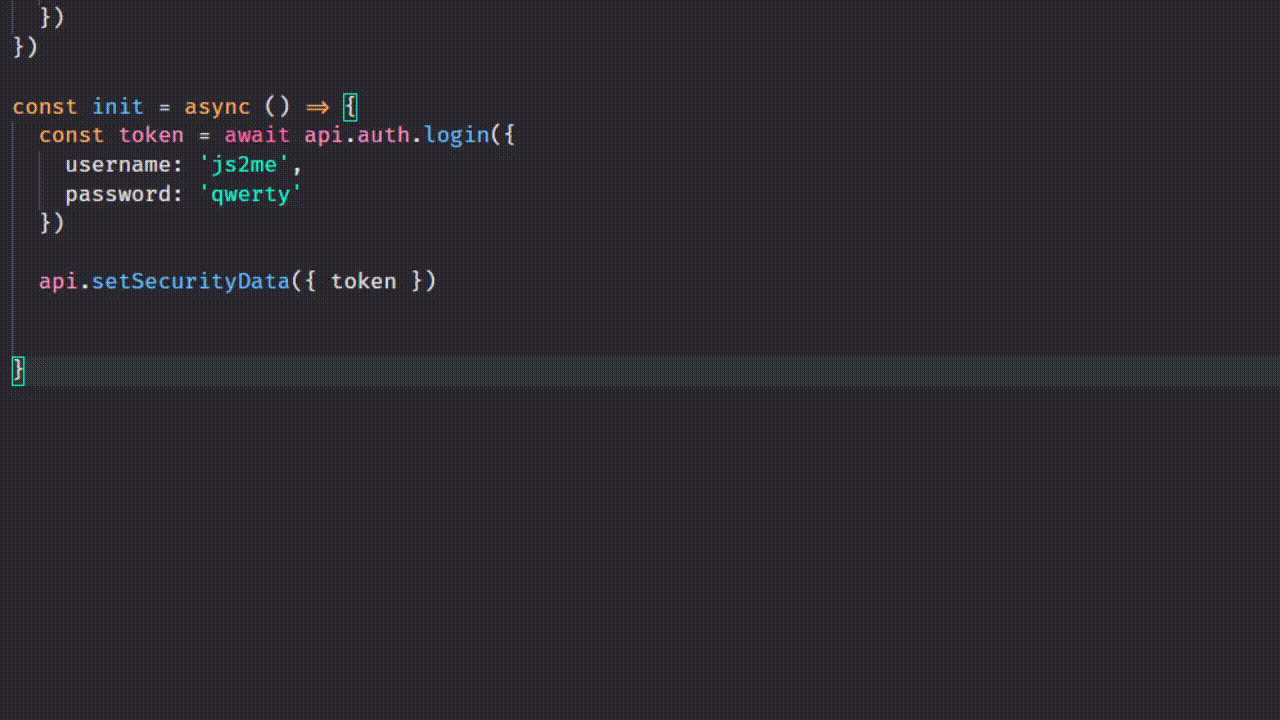
Research
/Security News
Critical Vulnerability in NestJS Devtools: Localhost RCE via Sandbox Escape
A flawed sandbox in @nestjs/devtools-integration lets attackers run code on your machine via CSRF, leading to full Remote Code Execution (RCE).
swagger-typescript-api
Advanced tools
The swagger-typescript-api npm package is a tool that generates TypeScript API client code from Swagger/OpenAPI definitions. It helps developers to create strongly-typed API clients, reducing the risk of runtime errors and improving the development experience.
Generate TypeScript API Client
This feature allows you to generate a TypeScript API client from a Swagger/OpenAPI definition. The `generateApi` function takes an object with configuration options such as the name of the output file, the URL of the Swagger definition, and the output directory.
const { generateApi } = require('swagger-typescript-api');
generateApi({
name: 'MyApi.ts',
url: 'http://api.example.com/swagger.json',
output: './src/api',
});Custom Templates
This feature allows you to use custom templates for generating the TypeScript API client. By specifying the `templates` option, you can provide a path to your custom templates, giving you full control over the generated code's structure and style.
const { generateApi } = require('swagger-typescript-api');
generateApi({
name: 'MyApi.ts',
url: 'http://api.example.com/swagger.json',
output: './src/api',
templates: './my-custom-templates',
});Generate API Client from Local File
This feature allows you to generate a TypeScript API client from a local Swagger/OpenAPI definition file. The `input` option specifies the path to the local Swagger file.
const { generateApi } = require('swagger-typescript-api');
generateApi({
name: 'MyApi.ts',
input: './swagger.json',
output: './src/api',
});The swagger-codegen package is a tool that generates client libraries, server stubs, and API documentation from Swagger/OpenAPI definitions. It supports multiple languages and frameworks. While it is similar to swagger-typescript-api, it is more mature and widely used but may not be as focused on TypeScript-specific features.
The typescript-fetch package is a TypeScript client generator for OpenAPI/Swagger definitions that uses the Fetch API. It is similar to swagger-typescript-api in that it generates TypeScript clients, but it specifically targets the Fetch API for making HTTP requests.

Generate api via swagger scheme.
Supports OA 3.0, 2.0, JSON, yaml
Generated api module use Fetch Api to make requests.
Any questions you can ask here or in our slack(#swagger-typescript-api channel)

All examples you can find here
Version with mustache templates is >4.0.0
Usage: sta [options]
Usage: swagger-typescript-api [options]
Options:
-v, --version output the current version
-p, --path <path> path/url to swagger scheme
-o, --output <output> output path of typescript api file (default: "./")
-n, --name <name> name of output typescript api file (default: "Api.ts")
-t, --templates <path> path to folder containing templates
-d, --default-as-success use "default" response status code as success response too.
some swagger schemas use "default" response status code
as success response type by default. (default: false)
-r, --responses generate additional information about request responses
also add typings for bad responses (default: false)
--union-enums generate all "enum" types as union types (T1 | T2 | TN) (default: false)
--route-types generate type definitions for API routes (default: false)
--no-client do not generate an API class
--enum-names-as-values use values in 'x-enumNames' as enum values (not only as keys) (default: false)
--js generate js api module with declaration file (default: false)
--extract-request-params extract request params to data contract (default: false)
Also combine path params and query params into one object
--module-name-index <number> determines which path index should be used for routes separation (default: 0)
(example: GET:/fruites/getFruit -> index:0 -> moduleName -> fruites)
--modular generate separated files for http client, data contracts, and routes (default: false)
-h, --help display help for command
Also you can use npx:
npx swagger-typescript-api -p ./swagger.json -o ./src -n myApi.ts
You can use this package from nodejs:
const { generateApi } = require('swagger-typescript-api');
// example with url
generateApi({
name: "MySuperbApi.ts", // name of output typescript file
url: 'http://api.com/swagger.json', // url where located swagger schema
})
.then(({ files, configuration }) => {
files.forEach(({ content, name }) => {
fs.writeFile(path, content);
});
})
.catch(e => console.error(e))
// example with local file
generateApi({
name: "ApiModule.ts", // name of output typescript file
input: resolve(process.cwd(), './foo/swagger.json') // path to swagger schema
})
.then(({ files, configuration }) => {
files.forEach(({ content, name }) => {
fs.writeFile(path, content);
});
})
.catch(e => console.error(e))
// example with parsed schema
generateApi({
name: "ApiModule.ts", // name of output typescript file
spec: {
swagger: "2.0",
info: {
version: "1.0.0",
title: "Swagger Petstore",
},
host: "petstore.swagger.io",
basePath: "/api",
schemes: ["http"],
consumes: ["application/json"],
produces: ["application/json"],
paths: {
// ...
}
// ...
}
})
.then(({ files, configuration }) => {
files.forEach(({ content, name }) => {
fs.writeFile(path, content);
});
})
.catch(e => console.error(e))
--templatesThis option needed for cases when you don't want to use default swagger-typescript-api output structure
Templates:
api.eta - Api class moduledata-contracts.eta - all types (data contracts) from swagger schemahttp-client.eta - HttpClient class moduleprocedure-call.eta - route in Api classroute-docs.eta - documentation for route in Api classroute-name.eta - route name for route in Api classroute-type.eta - (--route-types option)route-types.eta - (--route-types option)How to use it:
--modular option)--templates PATH_TO_YOUR_TEMPLATES option--module-name-indexThis option should be used in cases when you have api with one global prefix like /api
Example:
GET:/api/fruits/getFruits
POST:/api/fruits/addFruits
GET:/api/vegetables/addVegetable
with --module-name-index 0 Api class will have one property api
When we change it to --module-name-index 1 then Api class have two properties fruits and vegetables



❗❗❗ Please use the next branch :)
If you need to check your changes at schemas in tests folder before create a PR just run command npm run test:all
Licensed under the MIT License.
FAQs
Generate the API client for Fetch or Axios from an OpenAPI Specification
The npm package swagger-typescript-api receives a total of 283,005 weekly downloads. As such, swagger-typescript-api popularity was classified as popular.
We found that swagger-typescript-api demonstrated a healthy version release cadence and project activity because the last version was released less than a year ago. It has 2 open source maintainers collaborating on the project.
Did you know?

Socket for GitHub automatically highlights issues in each pull request and monitors the health of all your open source dependencies. Discover the contents of your packages and block harmful activity before you install or update your dependencies.

Research
/Security News
A flawed sandbox in @nestjs/devtools-integration lets attackers run code on your machine via CSRF, leading to full Remote Code Execution (RCE).

Product
Customize license detection with Socket’s new license overlays: gain control, reduce noise, and handle edge cases with precision.

Product
Socket now supports Rust and Cargo, offering package search for all users and experimental SBOM generation for enterprise projects.